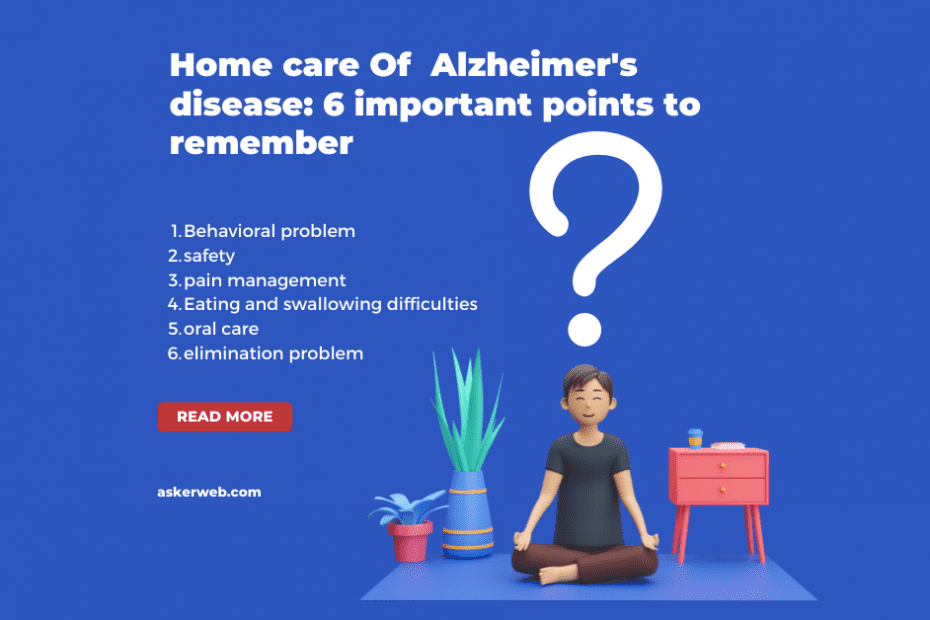Alzheimer’s disease is a progressive, degenerative disorder that attacks the brain’s nerve cells, resulting in loss of memory, thinking and language skills, and behavioral changes. Most people at the age of 65 or older have a great risk for loss of memory, disorientation its might result from a neurodegenerative disease called Alzheimer’s disease.
If you already know symptoms of Alzheimer’s disease, Alzheimer’s disease causes, Alzheimer’s disease stages, Alzheimer’s disease cure, you should know how to Homecare Of Alzheimer’s disease and 6 important points to remember. today Askerweb will tell in detail.
Table of Contents
✥ Home care Of Alzheimer’s disease:
Having a general daily routine in Alzheimer’s and dementia care helps caregiving run smoothly. These routines won’t be set in stone, but they give a sense of consistency, which Is beneficial to the Alzheimer’s patient even if they can’t communicate it.
While every family will have its own unique routine, you can get some great ideas from your medical team or Alzheimer’s support group, especially regarding establishing routines to handle the most challenging times of the day such as evenings.• Keep a sense of structure and familiarity. Try to keep consistent daily times for activities such as waking up at mealtimes, bathing, dressing, receiving visitors, and bedtime. Keeping these things at the same time and place can help orientate the person.

2 keypoints must to maintain for alzheimer’s disease patients:
• Let the person know what he or she completely understands. Use cues to establish the different times of the day. For example, in the morning you can open the curtains to let sunlight in. In the evening, put on quiet music to indicate it’s bedtime.
• Involve the person in daily activities as much as they are able. For example, a person may not be able to tie their shoes but may be able to put clothes in the hamper. Dipping plants outside may not be safe, but the person may be able to weed plants or water. Use your best judgment as to what is safe and what the person can handle.
Special care is to be taken for the specific problem of Alzheimer’s disease. These include:

- Behavioral problems: It occurs in about 90% of patients with AD.
Home care that may be helpful include:
- creating a calm and quiet environment.
- Maximizing exposure to daylight.
- Evaluating medication to determine if any could cause sleep disturbances. Consult with a physician regarding medication.

2. Safety: the patient may be a risk of injury from falls and sharp objects, ingesting dangerous substances, wandering, fire or burn, etc. these concerns require careful attention to the home environment to minimize the risk as well as the need for supervision.

3. Pain management: the patient may have difficulties in expressing physical complaints, including pain. Pain can be recognized by a patient’s behavior like increased vocalization, agitation, withdrawal, and changes in function. The patient should be treated promptly and the patient’s responses to be monitored.

4. Eating and swallowing difficulties: loss of interest in food and decreased ability to self-feed can result in significant nutritional deficiencies inpatient with AD. Pureed foods, thickened liquid, and nutritional supplements can be used Low lighting, music, and stimulated nature sound may improve eating behavior. When oral feeding is not possible NG tube feeding may be used for a short time.

5. Oral care: AD patient may be unable to perform oral care, the patient may be pocket food in the mouth, adding to the potential for tooth decay. The mouth should be inspected regularly and mouth care to be provided.
Skincare: it is important to monitor the patient’s skin over time. Rashes, redness, skin breakdown, should be noted and treated as appropriate.

6. Elimination problem: during the middle and last stages of AD, urinary and fecal incontinence lead to increased for nursing care. Habit and behavioral retraining of bladder and bowel function (e.g. schedule toileting) may help to decrease episodes of incontinence.
Trouble finding words, increased hand gestures, easy confusion, even inappropriate outbursts are all normal






